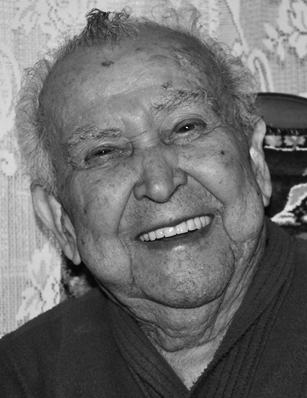Louis Falek
"I'm happy, I appreciate when people have been nice to me, I never forget. We are happier people here. The United States is the best country. Jewish organizations here gave me help. I have two sisters in South America. I’m happy, I appreciate when people have been nice to me, I never forget. We in turn donated to Jewish synagogues and I helped my family."
Name at birth
Moishe Lazar Falek
Date of birth
05/23/1914
Where did you grow up?
Klush, Romania
Name of father, occupation
Wolf Falek,
Transportation
Maiden name of mother, occupation
Regina (Rivka) Preissler,
Homemaker
Immediate family (names, birth order)
Parents and six children: Brucha, Sochar, Shlima, Hershel, Chana, Moishe Laza (myself)
Brucha had two children; they were taken away to Auschwitz. Sarah went to Uruguay in 1927, married Lazar Marcus. They had two children, Rachel and Victor.
In 1924, my father passed away. My mother, sister Chana, and I moved to Klush. When I became older, I married and had three children. I was taken into the Romanian army. The Germans invaded. The Jews of Klush were put into a ghetto. My wife and our three children were taken to Auschwitz.
From 1942 to 1944, I was taken by the Hungarian Fascists into a forced labor camp. We dug holes and laid the wood ties to build a railroad. I remember that in the morning, we were given black coffee in a rusty can and in the evening, some bread. If one couldn’t work, one would not be given any food or would be shot.
I remember the lice eating me alive, even under my skin. At times we were lucky to get potato peelings from the garbage. The Germans later took us to the war front where we repaired the roads for the tanks to go through.
In 1944, the Russians liberated us from the Germans. However, the Russians took us to Zaporozhe, Ukraine where we remained for four years. In 1948, we were released. I went back home to Satu Mare where I learned that my family had been murdered.
When I returned to Satu Mare, I met a young woman, Rose Tomas, age 17, who I married. We had two children together. We registered to go to Israel. My sister was there, and but we realized how hard a life it was there at that time. We changed our minds and immigrated to the United States instead. HIAS helped us come to Detroit. It was a very difficult life in Europe and the United States after the war ended.
Name of Ghetto(s)
Name of Concentration / Labor Camp(s)
Where were you in the Former Soviet Union?
Zaporozhye, Ukraine
When did you come to the United States?
1948
Where did you settle?
Detroit
How is it that you came to Michigan?
Sponsored by HIAS
Occupation after the war
Tool and die worker
Spouse
Rose Tomas,
Seamstress in a drapery business
Children
Leah (deceased) and Wilhelm, and one daughter
Grandchildren
One
What do you think helped you to survive?
I am a lucky man. G-d gave me power and I had the best wife in the world. I have always been an honest and decent man. I have a Jewish heart. I’m happy that my synagogue, Young Israel of Oak Woods, was so close to me.
What message would you like to leave for future generations?
I'm happy, I appreciate when people have been nice to me, I never forget.
We are happier people here. The United States is the best country. Jewish organizations here gave me help. I have two sisters in South America.
We are happier people here. The United States is the best country. Jewish organizations here gave me help. I have two sisters in South America.
I’m happy, I appreciate when people have been nice to me, I never forget. We in turn donated to Jewish synagogues and I helped my family.
Interviewer:
Charles Silow
Interview date:
09/30/2011
Experiences
Survivor's map

